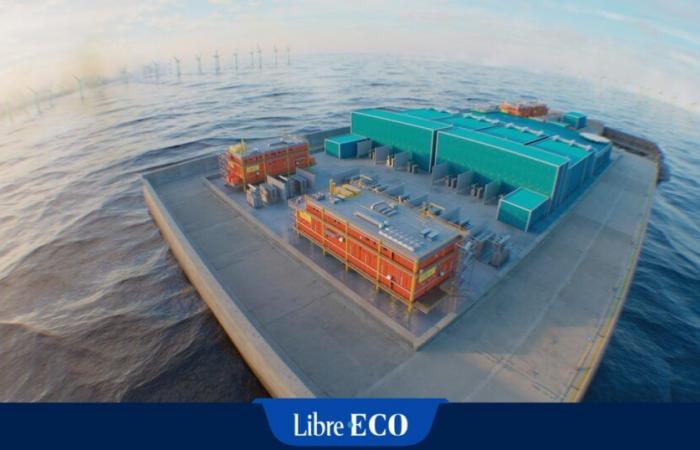According to Tinne Van der Straeten, it was above all the high-voltage direct current installation which caused the island’s budget to slip: in fact, the initial cost, of 1 billion euros, would have increased to an amount between 2.6 and 3 billion euros.
But this third major contract has not yet been validated by Elia. According to our information, its board of directors will have to give its approval, or not, by the end of the month.
Should the project be canceled?
This budgetary slippage leads some MPs to question the merits of the investment. As a reminder, the energy island has several functions. Located 45 km from the Belgian coast, it will be used to connect the new North Sea wind turbines to the Belgian electricity network. The island should also allow Belgium to connect to countries benefiting from strong renewable production. We are thinking of the United Kingdom, Denmark, the Netherlands, Norway… This connection with foreign countries should allow our country to access cheap renewable electricity.
But, so that the business case is positive, access to this cheap electricity must offset the cost of the energy island. Other countries must therefore agree to invest in an electrical interconnection with the artificial island. However, as we explained in The Freewe already know that Denmark is no longer interested. Copenhagen, which does not really need Belgian electricity, would like our country to finance more than half of the cost of the interconnection between the two countries… Unacceptable on the Belgian side, which is campaigning for a fair sharing of costs with the Denmark.
How much will the energy transition cost? “Bloody expensive”, replies the boss of Engie Belgium
Federal deputy Jean-Luc Crucke (Les Engagés) therefore wonders, given the position of Denmark and the “uncertainties” as for a future connection with Ireland and England, how profitable is the energy island project? Some also accuse Elia of having lightly assessed the benefits and costs of the project. “The basic problem is that we rushed towards the island project without serious analysis of costs and benefits and without seriously studying the alternatives.explains a source close to the matter. How to explain this lightness? This project suited both Tinne Van der Straeten and Elia. The environmentalist aims to turn the North Sea into a giant green power station. And Elia will benefit from the island because he is the one who carries the project”.
To check whether the investment is still viable, despite its soaring costs, Tinne Van der Straeten asked Creg to update the cost-benefit analysis. However, according to our information, the federal regulator is not equipped to carry out such a study. We come back to the problem repeatedly denounced by the federal regulator. It is Elia which alone has the resources to validate the merits of investments in the electricity network. And this, while Elia also benefits from these investments, since they support its economic activity.
Van der Straeten defends the project
For her part, Tinne Van der Straeten argues that the island is crucial for the security of Belgium’s electricity supply. According to the ecologist, it will provide, by 2030-2032, 25 to 30 terawatt hours of electricity, or the equivalent of the production of four nuclear reactors. The minister therefore wonders what the consequences would be of postponing the project. “Security of supply after 2030 must not be compromised”she declared, during the last hearing in the House.
Note that few projects, apart from gas-fired power plants with high CO2 emissions, could provide such a quantity of electricity in such a short time frame. However, some observers believe that simple offshore platforms could also make it possible to transport offshore wind electricity to Belgium. To which Tinne Van der Straeten replied that the cost of maritime platforms had also increased significantly.
Contracts already awarded
In any case, two large contracts have already been signed by Elia as part of the energy island project. The electricity network manager had announced an agreement of 600 million euros (instead of the initial budget of 450 million euros) for the island as such, and 1.45 billion euros for the infrastructure in alternating current. Difficult, in these conditions, to turn back. Especially since penalties could also be imposed, within the framework of the third major contract, if Elia does not respect the rules of the call for tenders. And all these costs will be paid, one way or another, by Belgian households and businesses…
Should we focus on nuclear power or foreign offshore wind power? Creg criticizes Elia’s study on the subject
A new hearing, with Elia and Creg, will take place this Tuesday in the Chamber. We will perhaps know more about the explosion of costs on the energy island.
Elia did not take into account the explosion of costs on the island
Elia recently published a study (called “Blueprint”) analyzing Belgium’s long-term energy supply. According to our information, this study does not take into account the explosion in the costs of the energy island. However, the study was published when information about the island’s budgetary slippage was already known to Elia.






